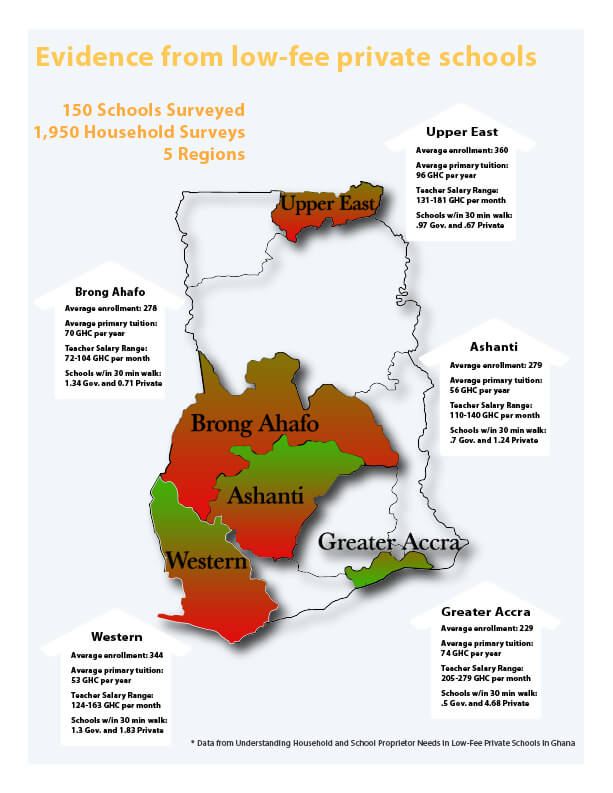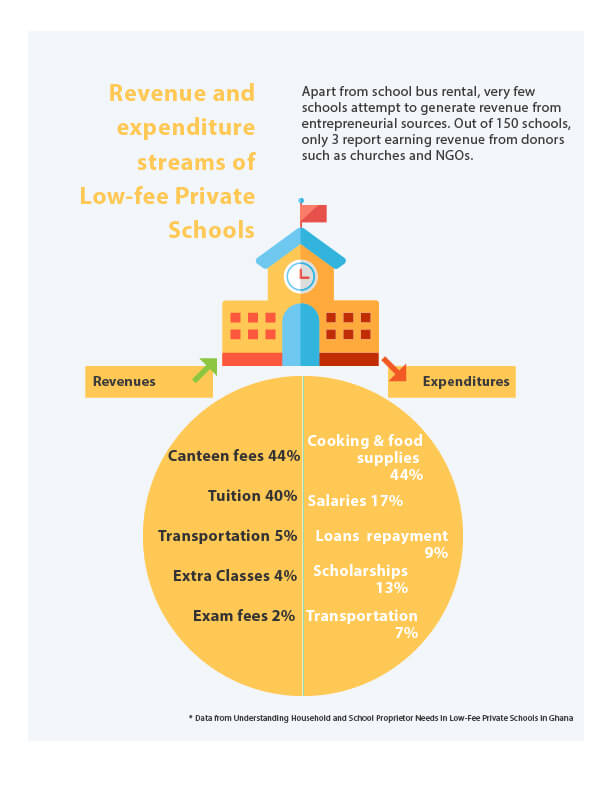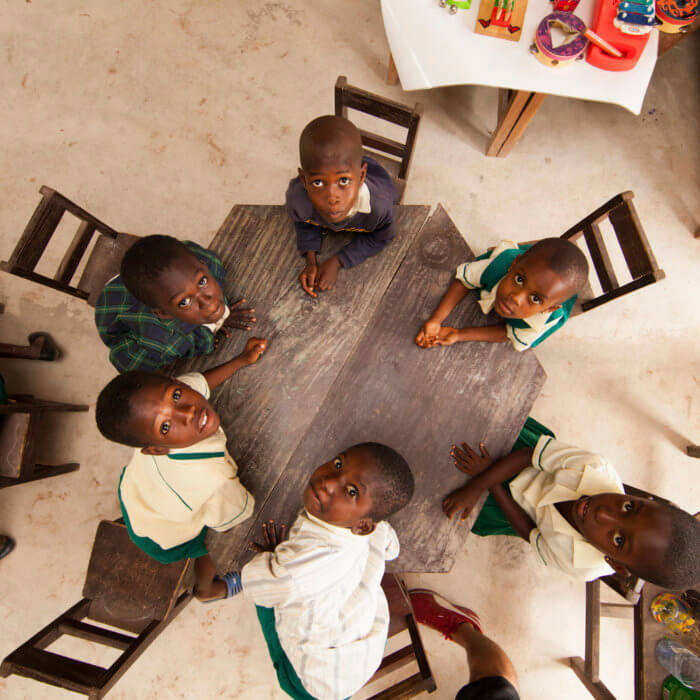As critical but uneven steps towards universal access to quality education are taken, growing numbers of families are turning to low-fee private schools to help prepare their children for a better future.
Millions of these families are refusing to wait until 2030 for universal access to become a global reality, and it is imperative that stakeholders match their urgency in efforts to better understand this growing demographic.
After an earlier examination of how much households spend on education in both the public and private sector in Kasoa, Ghana, Results for Development’s (R4D) latest report, “Understanding Household and School Proprietor Needs in Low-Fee Private Schools in Ghana,” adds more empirical evidence to a debate that is vigorous, but often ideologically-charged.
The report was conducted in partnership with Consumer Insight Consult Africa and the IDP Foundation, Inc. It features data from one of the largest reviews of its kind, focusing on the IDP Rising Schools Program’s impact, and contributing to the discourse of the low-fee private school (LFPS) sector’s effectiveness.
The findings include new information on how low-fee private schools (LFPS) in Ghana are currently operating, how parents are experiencing this new approach to education, and where stakeholders can improve student experiences in the future, for providers of public and non-state education alike.
 The Profitability Picture
The Profitability Picture
Policymaker assumptions about private school profitability have affected decisions about levels of support, collaboration, and more. Our research indicates that such expectations may need adjustments. Contrary to common perceptions, this study suggests that most low-fee private school proprietors are either breaking even or suffering a small loss in their operations. In fact, not only did we find that only about one-third of the schools surveyed were turning a profit, but significant majorities of these schools were actively pursuing flexible payment schemes to help parents continue enrolling their children despite errant income flows or financial hardships. For those that are making profits, these gains are most often quite modest.
“Our research disputes the notion that low-fee private school proprietors are ruthless business owners,” notes Mark Roland, Senior Program Officer at Results for Development and one of the report’s primary authors. The issue of profitability is linked to other significant findings. School proprietors complain that little revenue and poor access to credit limit their availability to improve school infrastructure. Indeed, this report finds that low-fee private schools often lack adequate infrastructure such as working toilets and safely designed classrooms.
The Importance of Teachers
With the latest details on the finances of LFPS, a more informed understanding of their decision-making processes is highlighted. This study reveals that despite financial constraints, low-fee private school proprietors are investing in teacher trainings to ensure high teaching quality. Nearly 91 percent of schools report having teacher guidelines, 82 percent provide in-service training, and 67 percent provide pre-service training programs. In what is even more impressive, our findings reveal that even with difficulties in generating adequate revenue and contrary to common perception, nearly 72 percent of LFPS who provide teacher training, manage to do so internally.
Challenges in Affordability
The need to balance the financial books, maintain education quality, and keep school fees affordable to low-income families is a struggle many proprietors face. Despite efforts to provide scholarships and flexible payments to parents, the report notes that low-fee private schools may still not be as affordable to the poorest of the poor as proponents have claimed in the past. While the average household in the study’s sample spends 8.2 percent of its income on education expenses, the financial burden of school fees is much higher among the lowest-income households, which were found to spend 18+ percent of their income on school fees. These findings support previous R4D research in Kasoa, Ghana, which found that significant costs exist for both public and private institutions alike, adding further complexity to the issue of affordability.
This new report draws from the data collected to provide practical recommendations for education stakeholders in Ghana and across contexts. The analysis identifies key lessons from current LFPS operations that demonstrated positive impact and considers next steps for proprietors and policymakers.
School officials described significant benefits from facilitated training in financial literacy, school management, and access to finance, provided by the IDP Rising Schools Program. These kinds of services were found to be highly relevant, with nearly 45 percent of surveyed school proprietors naming the financial training module on school accounting, bookkeeping, and capacity development as the most useful components of the IDP Rising Schools Program.
“The IDP Rising Schools Program is a unique program that empowers local individually-owned social enterprises, which happen to be schools serving the poor through a variety of carefully crafted loan and savings products,” says Irene Pritzker, President and Founder of the IDP Rising Schools Program.
 A Role for Governments
A Role for Governments
The struggle to improve access to quality education in the public sector is enormous, and state budgets unable to meet current needs have led governments to ignore low-fee private schools. Despite such constraints, this report identifies zero or low-cost initiatives focused on advocacy and more frequent sharing of best practices, which can nevertheless play a critical role in the promotion of universal learning opportunities.
International commitments to achieve universal, free, and quality education remain critical, but as this year’s Global Education Monitoring report revealed, the world is already 50 years behind in achieving the education-related goals within the 2030 Agenda for Sustainable Development.
Millions of children are refusing to wait until some future goal is met, and are turning in greater numbers every day to low-fee private schools. The parents of these growing millions yearn for better information about all schools’ effectiveness. They want quality teachers, and assurances that education is a top priority for all who shape their child’s education, from the school official to the government leader. What they want is not unreasonable, and more reports like the Needs and Impact Assessment released today will be critical in meeting their needs. These privately enrolled children cannot wait until 2030 for a quality education, and neither can implementers, researchers, or policymakers.
For additional details on the R4D/IDP Foundation publication’s findings, readers can view the report here. A key findings presentation may be found here.
* * *
About the IDP Rising Schools Program
In September 2009, the IDP Foundation, Inc., in partnership with Ghanaian financial institution Sinapi Aba Trust, commenced the IDP Rising Schools Program in Ghana to help school proprietors. With an estimated 6,000 low-fee private schools in Ghana, the program was developed in response to the clear market demand for an intervention that addressed the needs of this rapidly growing sector. With an initial average tuition of $15 USD per term for participating schools, the IDP Rising Schools Program was created to reach those at the base of the economic pyramid. After three years of demonstrated success, the program is fully developed and expanding throughout Ghana. To date, the program has served nearly 550 school proprietors, reaching about 130,000 children. Additionally, there have been more than 360 loans dispersed, with a loan repayment rate of 93 percent.
The IDP Rising Schools Program offers proprietors the necessary tools to prioritize for the future and create a stable learning environment. The program has shown that a business loan will enable schools to reach this goal after proprietors receive extensive training in financial literacy and school management, which is paid for through the loan terms. As a result, the program is now profitable for the financial institution, and therefore sustainable, scalable, and replicable.
The IDP Rising Schools Program strongly emphasizes working within the Government’s educational framework and positions proprietors to engage more efficiently with the government and its constituents. The IDP Rising Schools Program invests in communities by assisting existing schools that are often not well reached by the public education system because of either distance or governance. It is a realistic effort to respect, recognize, and empower the efforts of the poor to complement the Government’s efforts to provide education for all children.
About Consumer Insight Consult Africa
CIC is a full-service marketing research company based in Ghana, and dedicated to the provision of actionable and meaningful marketing research services to client across the West Afican Sub-region. The company is manned by a team of dedicated professionals with diverse research experience across the West African sub-regions, with over 10 years combined experience in market research. The collective experience of the CIC team enables adaptation and tailored research techniques to suit the needs of numerous clients.
In most cases, CIC’s research is used to guide strategic decisions, with help and guidance in taking projects from initial concept through to implementation.














